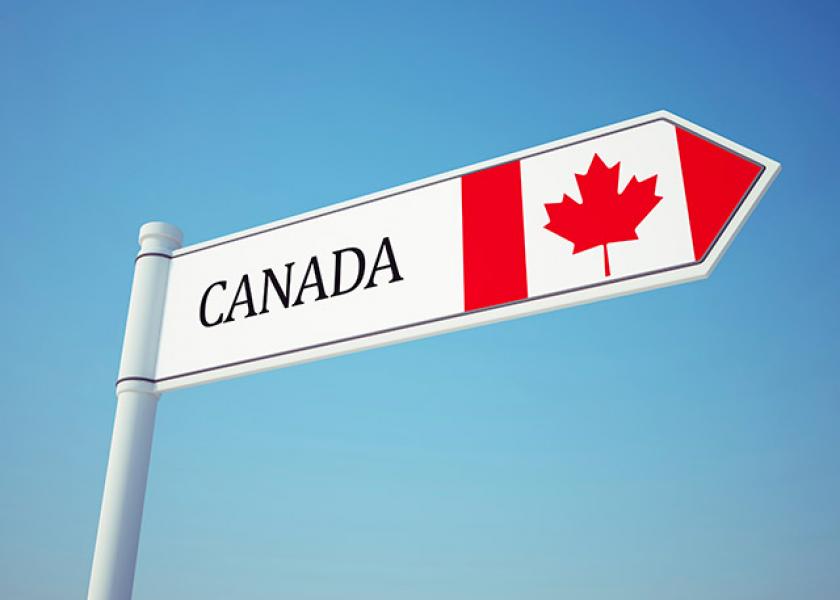U.S. House Members Urge Canada to Increase Market Access

Source: National Milk Producers Federation, U.S. Dairy Export Council
The National Milk Producers Federation and the U.S. Dairy Export Council commended a bipartisan and regionally diverse group of House members Wednesday for urging Canada to allow more imports of U.S. dairy products as an outcome of the Trans-Pacific Partnership (TPP) trade talks. If Canada cannot provide more dairy market access, it risks being left out of the massive Pacific Rim trade agreement now in the final stages of negotiation, according to a letter from key members of Congress.
In the letter to Canada’s ambassador to the U.S., Gary Doar, the House members said U.S. access to the Canadian dairy market will have a significant impact on how Congress views the final, 12-nation TPP agreement. “It will be difficult for us to support Canada’s inclusion in TPP if significant new dairy access is not part of the deal,” they wrote. The letter was spearheaded by Representatives Reid Ribble (R-WI), Ron Kind (D-WI), David Valadao (R-CA) and Suzan DelBene (D-WA). Among the signers were Paul Ryan (R-WI), Chairman of the Ways and Means Committee, Mike Conaway (R-TX), Chairman of the Agriculture Committee, and Pat Tiberi, Chairman of the Ways and Means Committee’s Trade Subcommittee.
NMPF and USDEC hailed this congressional message as a vital element to achieving the type of ambitious and balanced market access result that is still needed in the Trans-Pacific Partnership agreement.
“We applaud this group of House members for demanding that Canada get serious about allowing more dairy imports,” said NMPF President and CEO Jim Mulhern. “Creating meaningful U.S. export opportunities in the Canadian market is one of three critical dairy market access issues remaining in TPP and so far Canada has refused to live up to its commitment to address it. If U.S. dairy farmers are ultimately asked to grapple with greater competition under this agreement, it’s only right that they be able to have comparable product opportunities to tap into exports to Canada, as well as Japan.”
“Our members had hoped that TPP would eliminate all dairy tariffs in the region; that now appears unlikely,” added USDEC President Tom Suber. “Despite this, we see the prospect for ample market access gains – particularly into Japan and Canada. We hope to support a final agreement that ensures the United States gains at least as much increased dairy market access into those markets for major dairy commodities as it grants to our largest competitor in this agreement. Our industry is willing to do its part; Canada needs to do so as well if it wants to be part of TPP.”
Also needing to be addressed in the final phase of the TPP negotiations is the further expansion of access to the Japanese market for certain core dairy commodities. NMPF and USDEC have consistently stated that the final agreement must include net trade benefits for exports of major dairy commodities into Japan and Canada, TPP’s major dairy import destinations, in comparison with new dairy access into the United States for New Zealand, the world’s largest dairy exporter, for each of those products.
###
The National Milk Producers Federation, based in Arlington, Va., develops and carries out policies that advance the well-being of U.S. dairy producers and the cooperatives they collectively own. The members of NMPF's cooperatives produce the majority of the U.S, milk supply, making NMPF the voice of nearly 32,000 dairy producers on Capitol Hill and with government agencies. For more on NMPF's activities, visit www.nmpf.org.
The U.S. Dairy Export Council is a non-profit, independent membership organization that represents the global trade interests of U.S. dairy producers, proprietary processors and cooperatives, ingredient suppliers and export traders. Its mission is to enhance U.S. global competitiveness and assist the U.S. industry to increase its global dairy ingredient sales and exports of U.S. dairy products. USDEC accomplishes this through programs in market development that build global demand for U.S. dairy products, resolve market access barriers and advance industry trade policy goals. USDEC is supported by staff across the United States and overseas in Mexico, South America, Asia, Middle East and Europe. The U.S. Dairy Export Council prohibits discrimination on the basis of age, disability, national origin, race, color, religion, creed, gender, sexual orientation, political beliefs, marital status, military status, and arrest or conviction record. www.usdec.org







